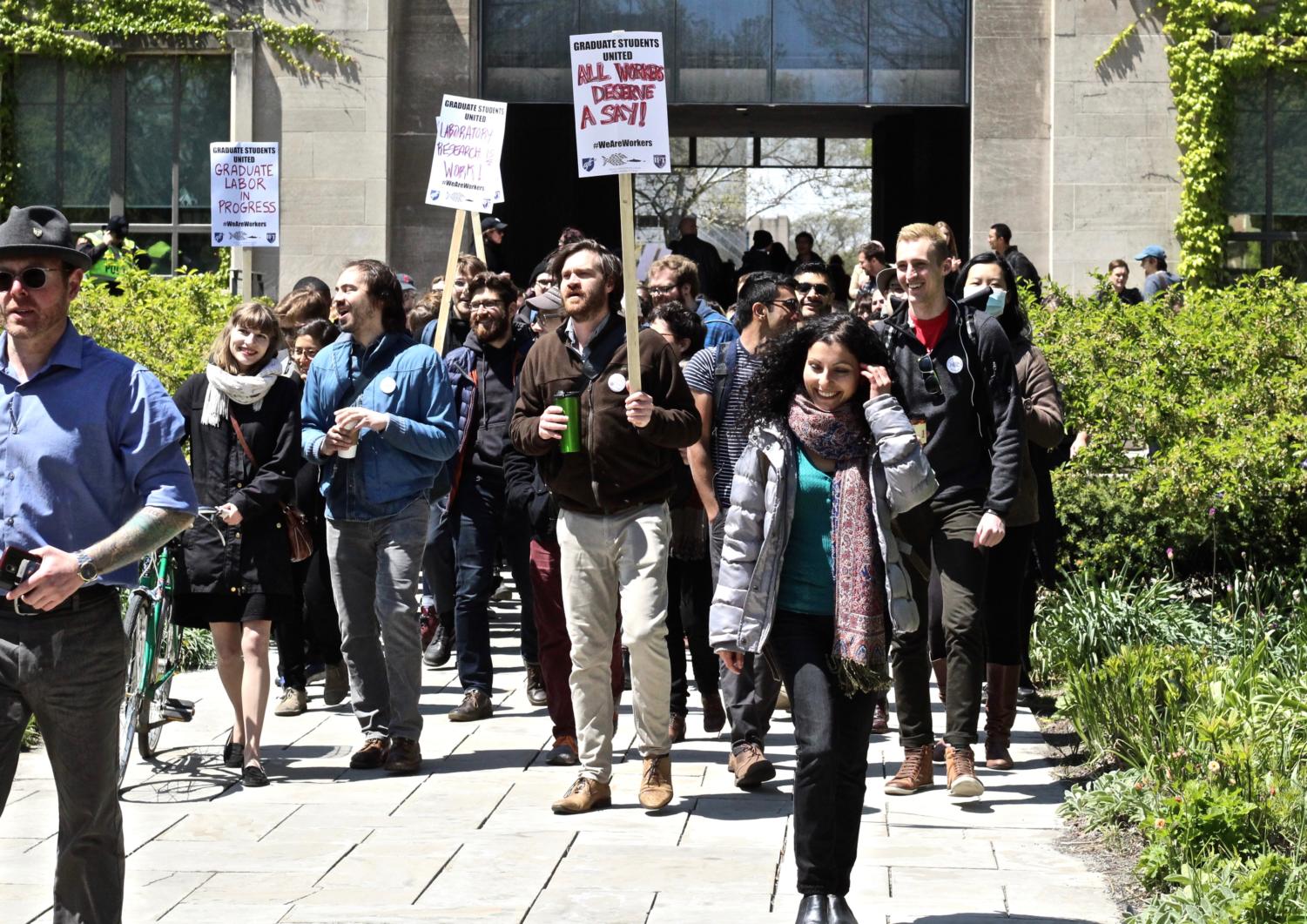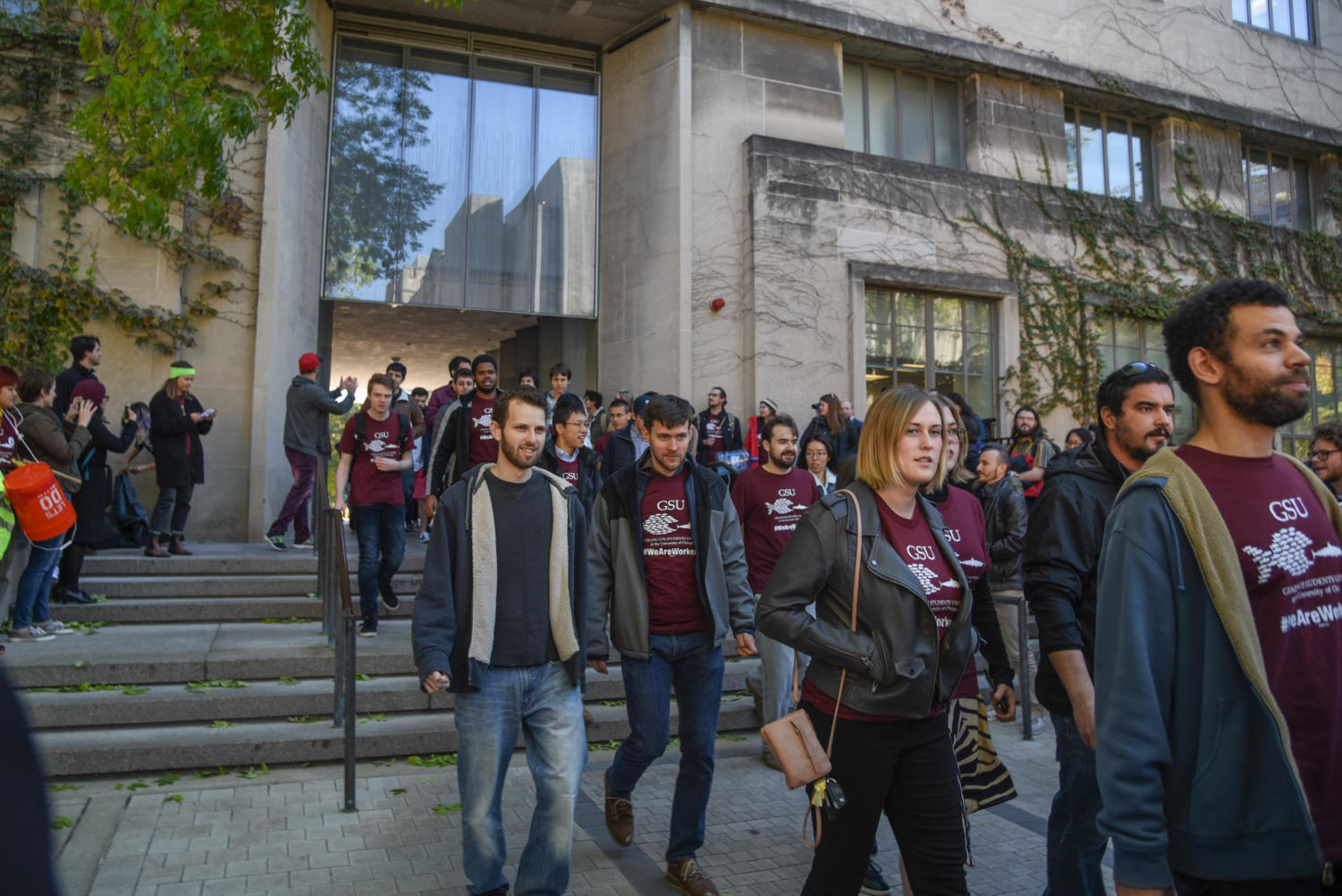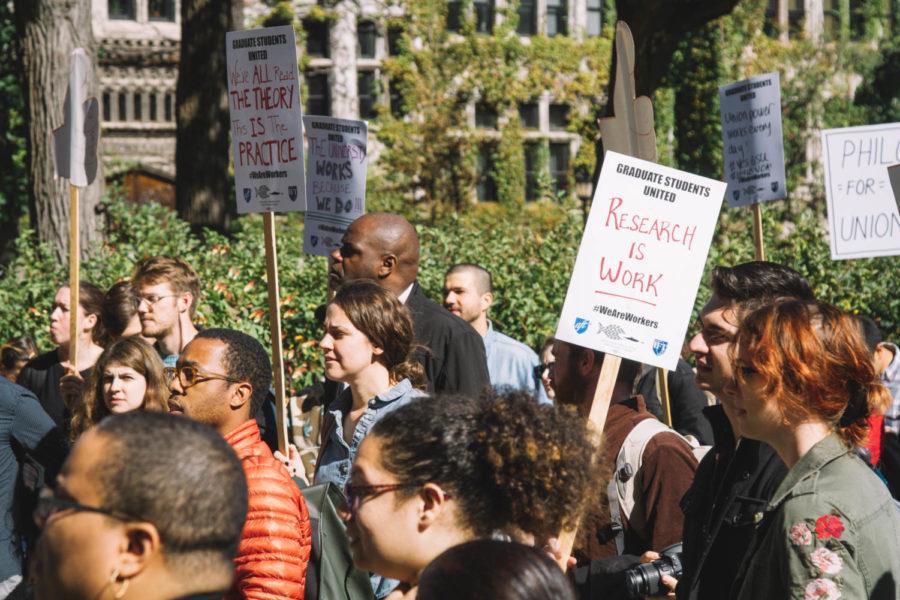Returning students need no introduction to Graduate Students United (GSU), the union of graduate student workers at the University of Chicago. This June, on the last week of the 2018–19 spring quarter, GSU made itself heard across campus, holding the first graduate student workers’ strike in University history. The strike resulted from deep-rooted discontent with administration’s ongoing non-recognition of GSU. Picket lines sprouted at the entrances of campus buildings; classes were cancelled, moved, and re-scheduled; and, for three days, the quadrangles rang out with chants of “bargain now” and popular songs with union-adapted lyrics.
Though the strike did not result in GSU’s recognition by the University, the union garnered national media attention, and supporters of Senator Bernie Sanders (A.B. ’64) joined the picket lines.

Tangled Legal History
Whereas graduate worker unionization at public universities is governed by state law, unionization at private universities is determined by the National Labor Relations Board (NLRB), a federal agency that has gone back and forth over the question of whether graduate students are considered employees. Republican majorities in the NLRB have ruled that graduate students are not employees—and therefore cannot form a union—while Democratic majorities have ruled that they are. Most recently, a majority of Obama-appointed NLRB members ruled that graduate students were employees in 2016’s Columbia decision.
This muddy legal situation has shaped GSU’s organizing tactics in recent years as the Trump administration has taken steps to weaken labor’s collective bargaining power. In late 2017, graduate workers at UChicago voted by a significant margin to form a union in an election conducted by the NLRB. But GSU, in coordination with unions at several other private universities, withdrew its petition to the NLRB in February 2018 over fears that the conservative majority of Trump appointees could use an ongoing unionization petition to overturn Columbia.
By withdrawing their petition, GSU and other graduate student unions hoped to deny Trump-appointed NLRB members the opportunity to rule on graduate student unionization. Nonetheless, the Trump-appointed majority has moved to impede unionization efforts like GSU’s. The board announced in May 2019 that it “will be engaging in rulemaking to establish the standard for determining whether students who perform services at a private college or university in connection with their studies are ‘employees.’ “
Historically the NLRB has relied on individual adjudications, not the formal rulemaking process, to establish policies. Policies created through adjudication can be easily overturned by a subsequent adjudication (for example, in ruling that graduate students could unionize, Columbia overturned a previous case that set the exact opposite precedent); however, a policy created through rulemaking is significantly more difficult to alter in the future. The process for changing such a rule is outlined by a piece of federal law—the Administrative Procedures Act—which requires that a new rulemaking process be undertaken with strict requirements, including public notice and comment.
The NLRB is expected to finish its rulemaking in September of this year. Despite GSU’s removal of its NLRB petition, the Trump-appointed majority on the Board has the potential to stymie unionization efforts through rulemaking.

What’s at Stake
Graduate students perform duties critical to the operations of the University. Across divisions and departments, graduate students work as instructors, research assistants, teaching assistants, tutors, and discussion group leaders.
Graduate student workers have raised a litany of grievances with their situation, among them inadequate and irregular compensation, unreasonable hours, and insufficient health insurance. GSU argues that a union would allow graduate students to leverage collective bargaining to negotiate solutions to these issues with the University through a legally enforceable contract.
University Opposition
The University has refused to recognize GSU on the grounds that graduate students perform duties as part of their education and are not employees.
Administrators have put forth numerous arguments describing the negative impacts a union would have on graduate students. In a 2016 op-ed, Vice Provost Jason Merchant raised several concerns, arguing that “a union would add a layer of cost and bureaucracy between students and their departments.” Union fees would deprive graduate students of a significant portion of their stipends, Merchant wrote.
Administrators have also argued that a graduate student union could give students say in their own departments’ admissions processes, interfering with professors’ autonomy in recruiting talented candidates and potentially lowering the quality of admitted students.
More recently, in an e-mail sent to the University community on the eve of GSU’s strike in June, Provost Daniel Diermeier reiterated the University’s position that graduate students receive fair compensation: “PhD students receive at least $30,000 annually, fully-paid health insurance premiums, and full tuition for the first five years of their programs.”
In the spring, the University acknowledged that payments to graduate students were frequently late or simply incorrect. Administration thus opened an e-mail hotline for graduate students to report pay discrepancies and promised to complete a full audit of payrolls this summer.
Diermeier’s e-mail also emphasized the University’s fundamental rejection of the characterization of graduate students as workers. “Graduate students are students, first and foremost,” he said. “They come to the university to study, to learn how to teach, and to make original contributions in their chosen fields of knowledge.”
Ongoing Organization
Absent a legal avenue to compel the University to recognize the union, GSU has held several public demonstrations over the past year in an effort to force the University to grant them voluntary recognition. Through such an agreement, the University would recognize GSU as the exclusive labor representative of UChicago graduate student workers.
The 2018–19 school year saw an escalation of organizing activity. In October of 2018, hundreds of GSU members organized a pro-union walkout, with more than 350 gathering in front of Levi Hall, home to many University administrators’ offices, to demand recognition.
Spring quarter saw the most dramatic escalation in union organization. In June, following the passage of a strike authorization vote by a margin of 1,134 to 112, GSU members walked off the job for three days during 10th week.
Demonstrating the days immediately preceding reading period and finals week increased the action’s potency. Had the labor action continued, fourth-years may not have graduated in time and undergraduates of all years might have been thrown into academic limbo, absent major University response. In an e-mail to students of the College, Dean Boyer stated that administrators had “planned for all contingencies.”
Though whether GSU would continue its strike through the end of the quarter was initially a matter of speculation, ultimately the union elected to end its demonstration in a vote convened after three days of striking. They did so partly out of concern for undergraduates.

Administrative Response
Meanwhile, the administration has explored ways to address graduate student concerns. The University convened the Committee on Graduate Education in April 2018 to investigate the state of graduate student education at UChicago. The committee produced a 595-page report addressing sources of graduate student dissatisfaction, including “changing job markets, increasing costs to both universities and students, increasing mental health issues in the student population, and the ongoing lack of diversity in the student (and faculty) population.”
In a May 2019 e-mail to the graduate student community, Diermeier promised “a holistic review of PhD programs” and “improved funding for PhD students and reform of the Graduate Aid Initiative.” He also vowed to host “regular conversations with graduate students on a variety of topics.”
Moving Forward
Despite the University’s recent actions, GSU has remained staunch in insisting that a union is the only route to improved conditions for graduate workers.
Speaking to The Maroon at the end of the summer on plans for the 2019–20 school year, GSU member Natalia Piland declined to provide specifics. “We’re checking in with everyone,” said Piland. “We’re seeing what everyone’s feeling.”









